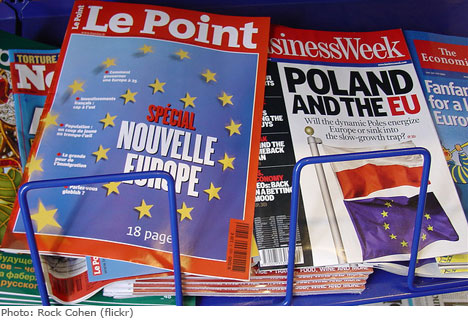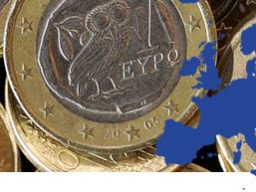There has been no central European response to the euro crisis. Its impact on the region differs from country to country, as do perceptions of its risks and remedies. Poland is the only country to have avoided falling into recession, while the Czech Republic and Slovakia have managed to sustain only limited damage. Hungary, in contrast, has borne the full brunt. Among the Baltic states, Estonia and Latvia have adapted quickly and managed to bounce back, after introducing unprecedented austerity measures. A first attempt to coordinate positions was made at a meeting of the Visegrad Countries (Poland, Hungary, the Czech Republic and Slovakia) in February 2009, just before a European summit during the Czech presidency. The Prime Minister of Hungary called for a pan-European rescue plan to avoid an “economic Yalta” in Europe. His Czech counterpart categorically refused the idea, precisely because such a thing could be interpreted as substantiating the idea of a continually divided Europe, with an eastern Europe within the EU. The Slovak prime minister went further still, stating that the situation in his country was “a thousand times better than in Hungary”. His formulation reflects the total absence of solidarity among central European countries and, in this case, is hard to understand unless one knows that for a thousand years Slovakia was a province of Hungary, whose kings were crowned in Pozsony, also known as Preßburg, though not yet Bratislava.
There are, however, certain common features in the way individual countries in the region have responded. Contrary to misconceptions, the central European countries have weathered the crisis better than the rest of the EU. The election year of 2010 witnessed the emergence of liberal and/or conservative rightwing coalition governments (with the exception of Hungary). This reflected these countries’ sense of affinity to German discipline as opposed to the French emphasis on growth, and a lack of tolerance for the budgetary laxness attributed to southern European countries. Europe is now split between a North and South rather than an East and West: in the face of the financial crisis, “we belong to Northern Europe”, as Poland’s Minister of Foreign Affairs declared. Former eastern Europe first became central Europe and is now claiming to be part of northern Europe! Evidently, the financial crisis has provided a new version of the mental map of the region. No less importantly, the Visegrad countries feared that France and Germany would close ranks and impose their own solutions, taking steps toward the creation of an “inner core” and a two-speed Europe.

Among the eurozone countries, Slovenia and Estonia (which took the risk of joining in the midst of the crisis) have submitted to the new constraints unflinchingly. Slovakia, on the other hand, refused to change the rules mid-game for a questionable cause (the Greek collapse). At the European summit in December 2011, Poland supported the proposals for greater regulatory powers for the EU. The Hungarian prime minister Viktor Orbán, on the other hand, first rallied behind the British veto but changed his mind and, like the Czechs, supported the Swedish position, i.e. to seek prior approval from the national parliaments. Hungary eventually approved the deal while the Czechs hardened their eurosceptic posture and voted against the pact on fiscal and budgetary discipline.
Differences in the situations of individual countries in the region partly explain their contrasting perceptions of – and reactions to – the euro crisis, and influence speculations regarding the future of the European project more generally. Their responses can be seen in terms of political lessons learned from the crisis of the European currency.
The Czech Republic: A lesson in euroscepticism
“The euro was never a good idea. It was bound to fail.” The declaration of Czech President Václav Klaus in November 2011 also contained an implicit “I told you so”. Klaus’ opposition to the single currency does indeed go back to its very inception. He agreed with the former British chancellor of the exchequer, Nigel Lawson, who claimed that monetary union was “the most irresponsible experiment of the post-war era”. Klaus, an economist by training, considers disintegration preferable to ongoing rescue attempts: a fiscal or redistributive Europe, he has argued, leads to a managed economy along communist lines – “and we know that there was no light at the end of the communist tunnel and we had to exit that tunnel”. The euro is a financial failure, according to Klaus, but it is more than that: the crisis reveals a dangerous logic that threatens democracy and the nation-state. When the Czech President’s book Evropská integrace bez iluzí (“European integration without illusions”) came out at the end of 2011, Lidové Noviny published a front-page interview with him entitled “We Are Governed by Sarkozy and Merkel”.
Klaus was exaggerating, but he represents the rejection of the dominant French-German duo and drives the agenda of the Czech media, which tends to take up his favourite topics in articles on “euro slavery” (Europe’s plan to rescue Greece) or “second-class members”. In other words, relief at not to be involved in the euro crisis is tempered by frustration at being unable to participate in decisions about the future, which is also the future of the European Union as a whole.
Václav Klaus sets the tone in Prague, all the more so without the counterbalance of his main political rival Václav Havel, whose euro-federalist speeches anyway had more resonance outside the Czech Republic than inside. There are two main currents on the Czech political scene. The rightist-conservative Civic Democratic Party (ODS), led by Prime Minister Petr Necas, has adopted a souverainist position, arguing for less integration. Faithful to its British role-model, the ODS left the European People’s Party (EPP) in the European Parliament and, together with the British Conservatives and the Polish Law and Justice party (PiS), formed an uncompromising group of eurosceptics. According to the ODS parliamentarian Jana Cernochova, “the European Free Trade Association (EFTA) is exactly the free association of states that suits us.” At the ODS party congress in October 2011, members voted unanimously for a referendum on the adoption of the euro. Recall that the referendum in June 2003 on the Czech Republic’s accession to the EU included the obligation, in principle, to adopt the European currency. The argument against adoption concerns ongoing changes in the management of the eurozone. Alexandr Vondra, ex-dissident and now defence minister, declared to the congress that the current crisis had been caused by “the permanent heterogeneity of the national traditions, cultures and economies of Europe, on which a false solidarity has all too often been imposed”. Vondra urges for national cohesion above all: “Concepts of multiculturalism are worthless today. On the contrary, the word ‘homeland’ ought not to be considered a dirty word but a value worth defending, for which we must be prepared to suffer.”
Thus the Czech government opted for a British eurosceptic posture, though its interests are not remotely similar. For the British, euroscepticism is justified, rightly or wrongly, by the need to defend the independence of the City of London as a financial centre; for the Czechs, euroscepticism makes no sense at all, since the country conducts three-quarters of its trade in the eurozone and is surrounded by eurozone members. Ideology is clearly the key here, though divergence between rhetoric and reality is bound eventually to catch up with the eurosceptics in Prague. It is not obvious why the Czech government refused European budgetary discipline while promoting it at home. It is no less odd to continue to hold up as a model a country with zero growth whose deficit reached 9 per cent in 2011 and its inflation 4.8 per cent.
The other, more pro-European position is defended by the social democratic opposition, as well as by the party of Karel Schwarzenberg, the TOP (tradition, responsibility, prosperity), which is part of the governing coalition. Schwarzenberg, the minister of foreign affairs, has declared that holding a referendum on the euro would amount to the country turning its back (literally, “your backside”) on its European partners. His party colleague, the finance minister Miroslav Kalousek, developed the argument further: a two-speed Europe is taking shape that is “contrary to the interests of the Czech Republic”, which, unlike Britain with the City, Switzerland with its banks or Norway with its gas, cannot afford to withdraw from European integration.
The European question thus divides the Czech government coalition; if the crisis continues, it is not impossible that the split will lead to the collapse of a government already undermined by corruption charges, while closer ties develop between “pro-European” social democrats and the liberal conservatives of the TOP. The European crisis a new fault-line reordering Czech politics. At the end of the day, it is pragmatism that characterizes both sides of the debate: the “pro-Europeans” take this position essentially because they feel their country barely has another option. The eurosceptics, meanwhile, argue that the end of the euro would not be end of the world. Just as the Czechs and Slovaks peacefully and pragmatically divided their country and their currency twenty years ago, they argue, so the members of the eurozone could take a leaf out of the Czecho-Slovak book.
Slovakia: A lesson in accounting
It is an irony of history that Slovakia, a country that fewer than twenty years ago mutually dissolved its common currency with the Czechs, joined the European monetary union in January 2008, just before the outbreak of the euro crisis. This occurred under the first government of Robert Fico and his leftwing Smer party. The Greek crisis coincided with elections in Slovakia in the spring of 2010 and the rise to power of a liberal-conservative coalition, whose leaders had promised not to bail out bankrupt countries with Slovak taxpayers’ money. Iveta Radicova, who became prime minister in the summer of 2010, argued that not only was Slovakia poorer than Greece – the average salary in Slovakia (780 euros) is equivalent to the Greek minimum wage – but also that, over the last decade, Slovakia had implemented a series of unpopular public spending reforms (labour market, pensions and healthcare) required by the criteria for euro entry. No sooner had it done this, the agreement of 21 July 2011 obliged it to contribute considerable sums (equivalent to half of its budget) to rescuing a country that for the last thirty years had been a large recipient of European funds.
Under these conditions, it was not easy for Slovak government parties to go back on what they had constantly repeated during their election campaign. Caught between pressure from Europe and mostly hostile domestic reactions, Radicova’s government was divided between those who, in her words, are for “no European funds, no guarantees, no aid and letting the crisis sort itself out” and those who argued that “we have obligations, we belong to the eurozone, we are responsible and we cannot accept the advantages without sharing the problems”.
Richard Sulik, who had founded the liberal-conservative party Liberty and Solidarity (SaS) shortly before the 2010 elections, defended the first position (“we will not give another cent”). Apparently preferring liberty over solidarity, his party refused to approve Slovakian contribution to the European Financial Stability Fund, which resulted in the collapse of the government coalition and the announcement of early elections. The opposition party Smer, although in favour of the euro, refused to back Radicova in a confidence vote, and was returned to power with an absolute majority in March 2012. Yet although the election was provoked by the euro crisis, the election campaign was run on the fight against corruption. The result may facilitate government support for the euro, but should by no means be interpreted as a conversion in Slovak public opinion on the way it is being rescued.
The Radicova government was one of the numerous political casualties of the euro crisis. This was an eye-opener: Greece had been admitted to the eurozone for political reasons (mainly French advocacy) without being economically, financially and institutionally ready. Slovakia, on the other hand, had shown that it was prepared economically and financially, however unprepared politically.
Hungary: A lesson in humility
After the landslide victory of Fidesz in spring 2010, giving it a two-thirds parliamentary majority, the Hungarian prime minister Viktor Orbán immediately announced his intention to free Hungary from financial dependence on foreign powers, namely the International Monetary Fund and the European Union. “Neither the IMF nor the financial leaders of the EU are our bosses and we are not their underlings”, he announced. After the crisis first broke out in 2008, the (socialist) predecessor government had obtained a loan of 20 billion dollars from the IMF with European support. In order to shake off this legacy, the Orbán government implemented a series of radical measures directly attacking the interests of bankers and foreign investors. He refused the final instalment of the IMF loan, re-nationalized private pension funds and levied taxes on banks and certain multinational companies. He also promised to fix the exchange rate between the Hungarian forint and the Swiss franc (1 Swiss franc for 180 forints), so that Hungarian citizens would be able repay their mortgages. In 2008, the exchange rate was around 140 forints; today it is 263 forints per Swiss franc. Banks, mainly Austrian, were concerned that they would have to make up the difference between the rate recommended by Orbán and that recommended by the market. The government also set out to investigate the origin of loans in foreign currency. This brutal intervention created distrust in financial circles and sparked Austrian and German protests that were relayed by the EU Commission.
In April of 2011, while Hungary was still holding the EU presidency, the parliament adopted a new constitution that strengthened the power of the executive at the expense of the intermediary bodies and politically “neutral” agencies (the Central Bank, the State Audit Office and especially the Constitutional Court, whose members are now appointed by the Fidesz government). More than three hundred fifty laws have been enacted within the Fidesz government’s first two years, starting with a repressive law aimed at the media and followed by over thirty constitutional laws. Although it was amended following criticisms from the European Commission, the law still forces political compliance, especially as regards the public broadcasting. An attempt has also been made to tighten control over the judiciary by forcing over two hundred judges to take early retirement and replacing them with younger judges close to Fidesz prepared to implement retroactive justice against leaders of the socialist party, for wrongdoings allegedly committed during the communist period. Claiming to break with the communist past, Orbán refers back to the nationalist and authoritarian Hungary of the Horthy era (1920-45). Double talk about reckoning with communism on the one hand and the embrace of the frustrated nationalism of the inter-war period are strongly connected to Orbán’s political and economic sovereignism, which relies on internal polarization and a histrionic defiance of foreign financial institutions.
However, the latter are taking their revenge. Orbán has now been forced by the deterioration of the financial situation to make an about-face and call on the IMF for help. And in November 2011, Standard & Poor’s downgraded Hungary’s credit rating to BBA-. Hungarian debt is currently sold at an interest rate of 9.4 per cent (the highest in Europe after Greece), while the forint lost 20 per cent of its value during the last quarter of 2011. Moreover, there has been a continuous flight of capital towards neighbouring Austria. Cornered, Orbán was forced to propose “a new type of cooperation” with the IMF in an attempt to reassure the EU, without whose blessing no IMF loan will be granted. Politically, the EU has done little to counter the authoritarian tendencies in Hungary. It is the economic lever that seems most efficient way of bringing Orbán back to the harsh realities of European constraints.
The Humbling, the title of Philip Roth’s recent novel, provides a fitting description of what the Hungarian government is experiencing. What we have witnessed with Hungary is a lesson in humility for a leader who wanted to reclaim his nation’s sovereignty.
Poland: A lesson in being European
Poland is exceptional in central eastern Europe, both for the performance of its economy and for its ambition to become an important European player at a time when the euro crisis looms large. For its neighbours, the crisis is primarily a threat. For Poland, it has been an occasion to take responsibility and formulate a response to the European challenge. The first noteworthy feature of Poland is strong growth, sustained even during the crisis (3.8 per cent in 2010 with a similar number expected for 2011). The second specific feature is the sustained popularity of the governing liberal Civic Platform (PO), re-elected in the October 2011 elections. Everywhere else, voters were all too happy to eliminate outgoing governments deemed responsible for the crisis. The centre-right government of Donald Tusk had no serious opposition on the left and stood his ground in the campaign against Jaroslaw Kaczynski’s nationalist-populist Law and Justice party (PiS). Modernisation “in Europe’s name” has been the dominant feature of the last two decades in Poland and has sharpened the divide between the urban, educated middle class in the western part of the country and the more rural and traditionalist eastern part of the country. The divide is reflected in the vote for the PO over the PiS, but also in the government’s approach to the EU and its positioning as a major actor on the European scene.
The fact that Poland is an exception, in a double sense, partly explains the attitude of the country towards the euro crisis. Polish leaders know that it is in the best interests of a country three quarter of whose trade is conducted with the European Union and 40 per cent of whose GDP is made up of exports to Germany that the euro and the European project survive. Even if the Polish EU presidency voiced concerns about the way the big nations of the eurozone bypassed European institutions in making some decisions, the reactions of Polish officials betrayed neither Schadenfreude (in the style of Václav Klaus) nor a wait-and-see policy, nor even a temptation to take advantage of the situation and get on with the dilution or even deconstruction of the European project (in the manner of the Czech and British eurosceptics).
The way Poland thinks about the euro crisis and its role in it is best illustrated by a speech by the Minister of Foreign Affairs, Radek Sikorski, in Berlin in November 2011. It was surely the most important speech given by a minister of foreign affairs of a central eastern European country in the last twenty years. After reminding the audience that the enlargement of the European Union had nothing to do with the crisis (of course!), the Polish minister reached his central point:
We have a Europe with a dominant currency but no single Treasury to enforce it. We have joint borders without a common migration policy. We are supposed to have a common foreign policy, but it is divorced from real instruments of power and often weakened by member states cutting their own deals.
The breakup of the euro would trigger “a crisis of apocalyptic proportions” that would affect the single market and the foundations of the Union. If we refuse to risk a partial dismantling of the Union, argued Sikorski, then the choice will be, as for all federations: “deeper integration or collapse”. The European Central Bank must become lender of last resort and the Commission should have more power and fewer commissioners, he said, going on to remind Britain (a benchmark country for Polish governments in the 1990s on European questions) that its accumulated debt (sovereign, corporate and household) exceeds 400 per cent of its GDP, and hence that they neither have lessons to give nor valid reasons to prevent further integration: “If you can’t join us, please allow us to forge ahead”. Finally, the Polish minister addressed Germany, which he called “the biggest beneficiary of the current arrangements” and therefore the country that has the biggest obligation to make them sustainable. He ended by declaring: “The biggest threat to the security and prosperity of Poland would be the collapse of the eurozone.” And then, an extraordinary thing to say for a Polish politician:
I fear German power less than I am beginning to fear German inactivity. You have become Europe’s indispensable nation. You must not fail to lead. Not dominate, but lead in reform.
At a moment when Sarkozy and Merkel, under pressure to manage the crisis, are inadvertently and fitfully moving towards federalism by another name, it is the minister of a central eastern European state that knows as well as any other what it means to regain national sovereignty that has provided a real lesson in being European – not only to its central European neighbours, but also to the founding countries, which seem to have forgotten the basics. The Weimar triangle – France, Germany and Poland – has for a long time been looking for a raison d’être. The Polish response to the crisis suggests that it might exist, and may thus help provide the framework for a future European architecture.
From periphery to centre
The economic and financial crisis that began in 2008 has demonstrated that the countries of central Europe do not have a common response. The euro crisis, with its explicit political stakes for the construction Europe in the future, reveals contrasting perceptions that are related to different ways of thinking about the nation-state and the European project. Responses to the crisis have revealed profound divisions internally and also certain differences between new EU members, marked by a split between two political cultures: a “sovereignist” pole and a “pro-European” pole. Slovakia is part of the eurozone and seems to regret it, but is compelled to follow suit. Viktor Orbán’s Hungary is not part of the eurozone and is determined to “regain sovereignty” – only to quickly realize its limitations.
However, the most striking contrast is between the Czech Republic and Poland as regards the European core taking shape around the eurozone: the former is visibly relieved not to be part of it, even at the risk of missing the boat of the next big step in European integration and finding itself relegated to an outer circle of the EU. Poland, by contrast, even though it is strongly attached to its sovereignty for historical reasons, and even though it is not a member of the eurozone, behaves as if it were, urging a “great leap forward” into federalism. Poland has understood that it is in the best interests of central Europe to do everything it can to save the European project. That implies behaving not as a peripheral state and mere spectator of the crisis, but as an actor belonging to the core engaged in building a new Europe.







